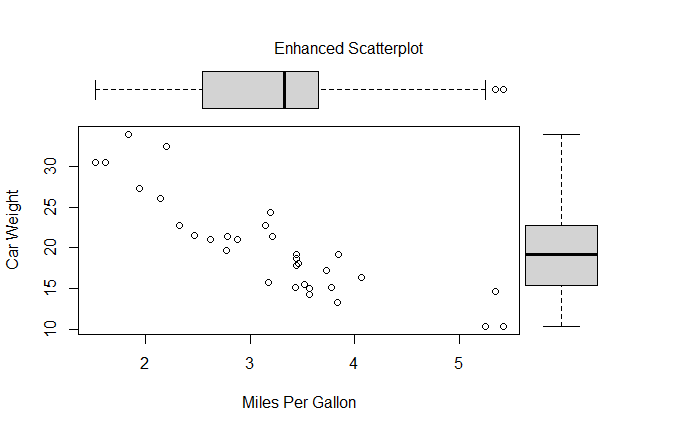R语言实战:图形初阶
目录
本文内容来自《R 语言实战》(R in Action, 2nd),有部分修改
使用图形
attach(mtcars)
plot(wt, mpg)
abline(lm(mpg ~ wt))
title("Regression of MPG on Weight")
detach(mtcars)
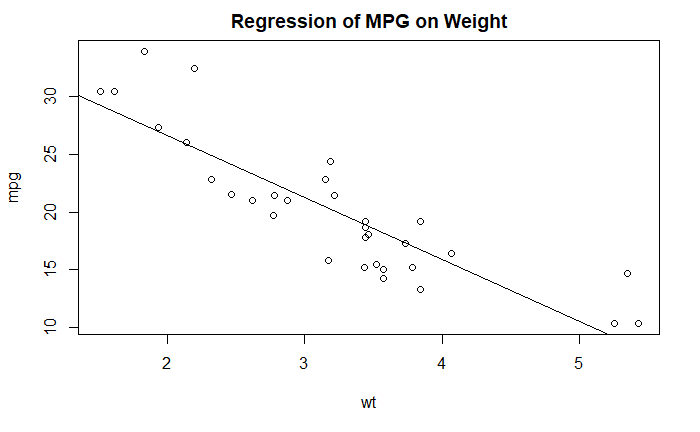
简单示例
dose <- c(20, 30, 40, 45, 60)
drugA <- c(16, 20, 27, 40, 60)
drugB <- c(15, 18, 25, 31, 40)
plot(dose, drugA, type="b")
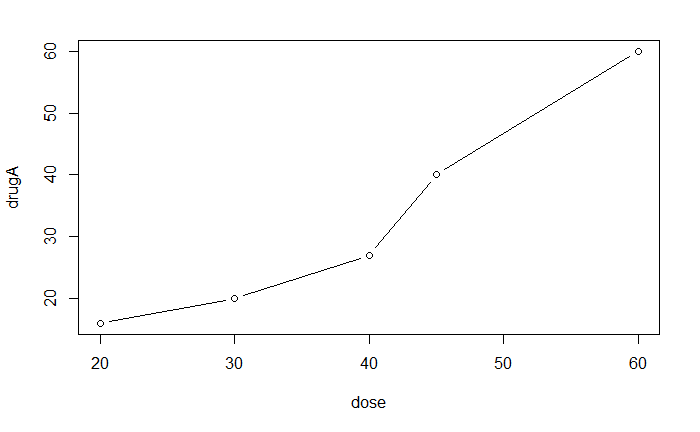
图形参数
使用 par() 函数设置绘图样式
opar <- par(no.readonly=TRUE)
par(lty=2, pch=17)
plot(dose, drugA, type="b")
par(opar)
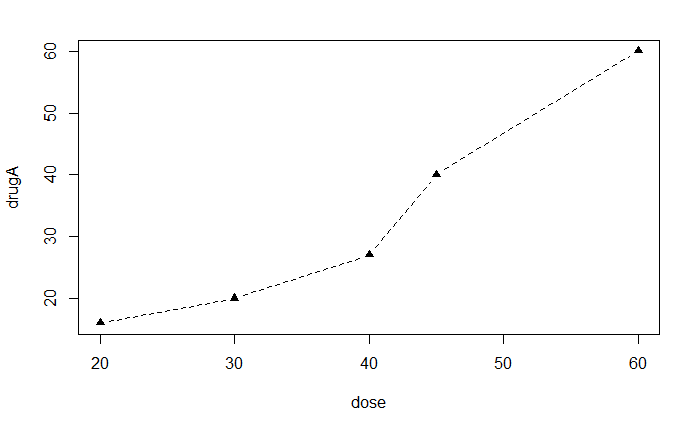
某些参数可以直接在绘图函数中设置
plot(dose, drugA, type="b", lty=2, pch=17)
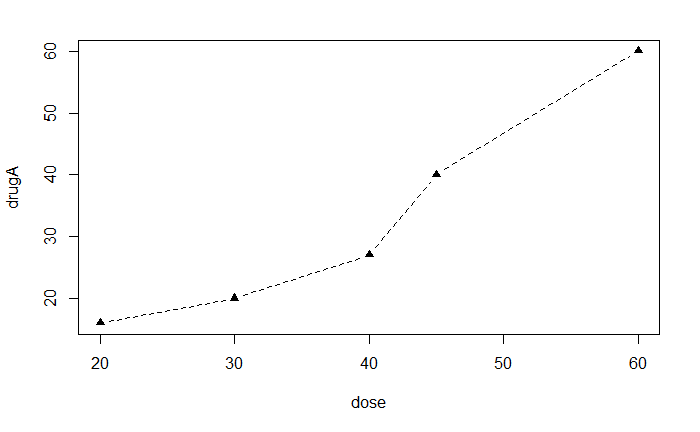
符号和线条
pch:点符号lty:线条类型cex:符号大小lwd:线条宽度
plot(
dose, drugA,
type="b",
lty=3,
lwd=3,
pch=15,
cex=2
)

颜色
col:默认颜色col.axiscol.labcol.maincol.sumfg:前景色bg:背景色
颜色值可以是:
- 序号
- 颜色名称
- 十六进制
- RGB
- HSV
RColorBrewer 库
library(RColorBrewer)
n <- 7
mycolors <- brewer.pal(n, "Set1")
barplot(rep(1, n), col=mycolors)

gray() 函数
n <- 10
mycolors <- rainbow(n)
pie(rep(1, n), labels=mycolors, col=mycolors)
mygrays <- gray(0:n/n)
pie(rep(1, n), labels=mygrays, col=mygrays)
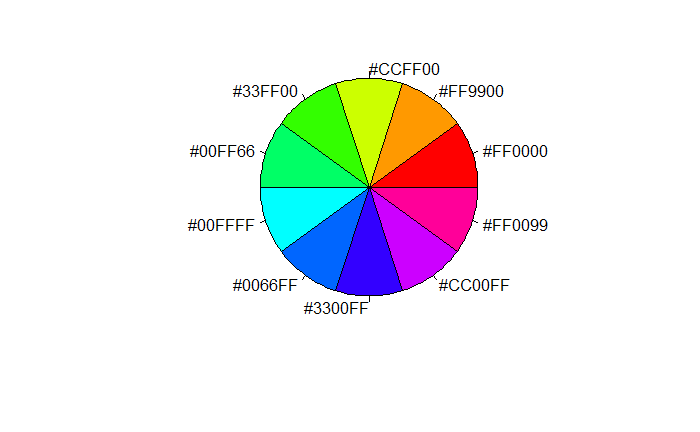
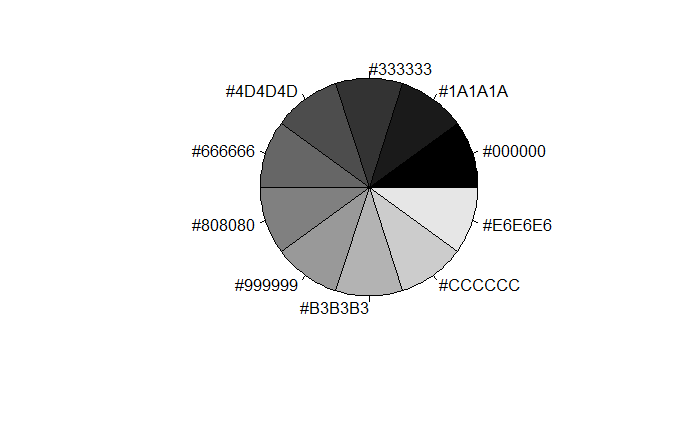
文本属性
cex:大小font:字体ps:字体磅值family:字体族,标准取值为serif,sans,mono
图形尺寸与边界尺寸
pin:图形尺寸,英寸,宽和高mai:边界大小,英寸,下、左、上、右mar:边界大小,英分
opar <- par(no.readonly=TRUE)
par(pin=c(2, 3))
par(lwd=2, cex=1.5)
par(cex.axis=.75, font.axis=3)
plot(
dose, drugA,
type="b",
pch=19,
lty=2,
col="red"
)
plot(
dose, drugB,
type="b",
pch=23,
lty=6,
col="blue",
bg="green"
)
par(opar)


添加文本、自定义坐标轴和图例
plot(
dose, drugA,
type="b",
col="red",
lty=2,
pch=2,
lwd=2,
main="Clinical Trials for Drug A",
sub="This is hypothetical data",
xlab="Dosage",
ylab="Drug Response",
xlim=c(0, 60),
ylim=c(0, 70)
)

标题
title()
坐标轴
axis()
side:坐标轴的位置,1 - 4at:刻度线位置labels:文字标签pos:轴线绘制位置,与另一坐标轴相交的位置ltycollas:标签平行(=0)或垂直(=1)于坐标轴tck:刻度线长度,正值内侧,负值外侧
x <- 1:10
y <- x
z <- 10/x
opar <- par(no.readonly=TRUE)
par(mar=c(5, 4, 4, 8) + 0.1)
plot(
x, y,
type="b",
pch=21,
col="red",
yaxt="n",
lty=3,
ann=FALSE
)
lines(
x, z,
type="b",
pch=22,
col="blue",
lty=2
)
axis(
2,
at=x,
labels=x,
col.axis="red",
las=2,
)
axis(
4,
at=z,
labels=round(z, digits=2),
col.axis="blue",
las=2,
cex.axis=0.7,
tck=-.01
)
mtext(
"y=1/x",
side=4,
line=3,
cex.lab=1,
las=2,
col="blue"
)
title(
"An Example of Creative Axes",
xlab="X values",
ylab="Y=X"
)
par(opar)

参考线
abline(h=yvalues, v=xvalues)
图例
legend()
locationtitlelegend:标签组成的字符型向量
opar <- par(no.readonly=TRUE)
par(
lwd=2,
cex=1.5,
font.lab=2
)
plot(
dose, drugA,
type="b",
pch=15,
lty=1,
col="red",
ylim=c(0, 60),
main="Drug A vs. Drug B",
xlab="Drug Dosage",
ylab="Drug Response"
)
lines(
dose, drugB,
type="b",
pch=17,
lty=2,
col="blue"
)
abline(
h=c(30),
lwd=1.5,
lty=2,
col="gray"
)
library(Hmisc)
minor.tick(
nx=3,
ny=3,
tick.ratio=0.5
)
legend(
"topleft",
inset=.05,
title="Drug Type",
c("A", "B"),
lty=c(1, 2),
pch=c(15, 17),
col=c("red", "blue")
)
par(opar)

文本标注
text()
mtext()
locationpos:1-4,文本相对于位置参数的方位side:1-4,放置文本的边
attach(mtcars)
plot(
wt, mpg,
main="Mileage vs. Car Weight",
xlab="Weight",
ylab="Mileage",
pch=18,
col="blue"
)
text(
wt, mpg,
row.names(mtcars),
cex=0.6,
pos=4,
col="red"
)
detach(mtcars)

opar <- par(no.readonly=TRUE)
par(cex=1.5)
plot(
1:7, 1:7,
type="n"
)
text(
3, 3,
"Example of default text"
)
text(
4, 4,
family="mono",
"Example of mono-spaced text"
)
text(
5, 5,
family="serif",
"Example of serif text"
)
par(opar)
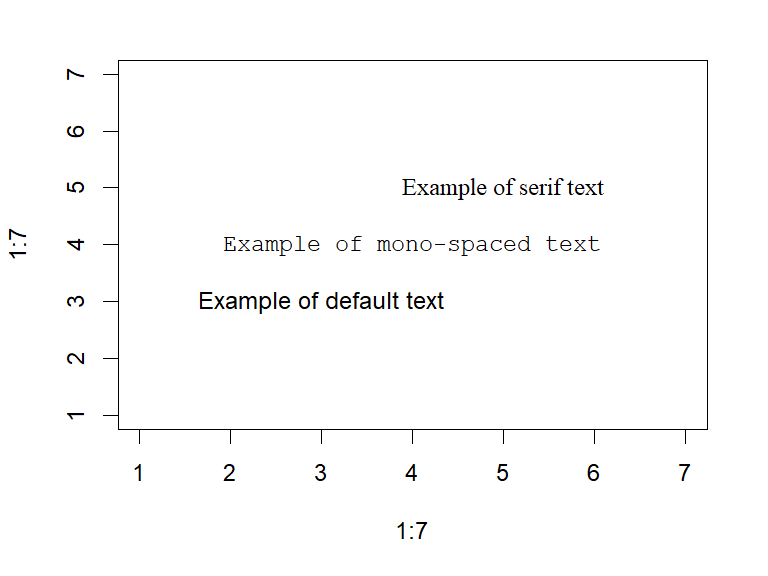
数学标注
plotmath
图形的组合
par() 函数的 mfrow=c(nrows, ncols)
layout()
两行两列
attach(mtcars)
opar <- par(no.readonly=TRUE)
par(mfrow=c(2, 2))
plot(
wt, mpg,
main="Scatterplot of wt vs. mpg"
)
plot(
wt, disp,
main="Scatterplot of wt vs. disp"
)
hist(
wt,
main="Histogram of wt"
)
boxplot(
wt,
main="Boxplot of wt"
)
par(opar)
detach(mtcars)
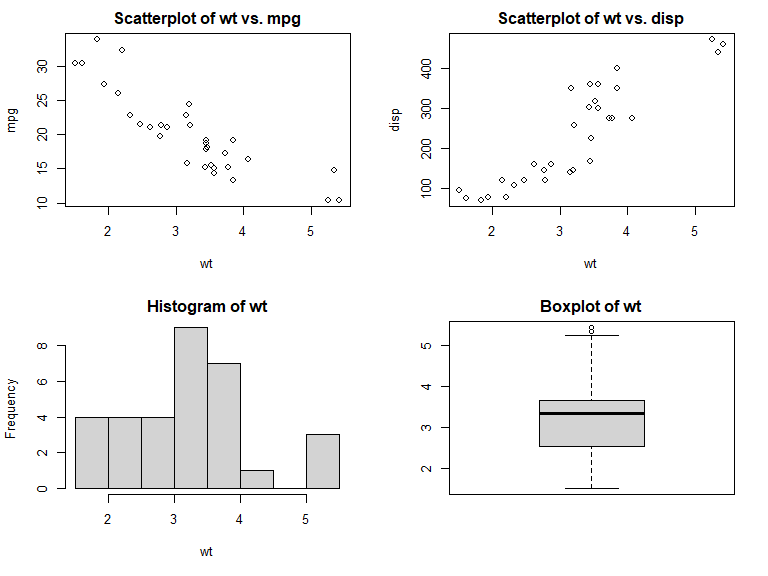
三行一列
attach(mtcars)
opar <- par(no.readonly=TRUE)
par(mfrow=c(3, 1))
hist(wt)
hist(mpg)
hist(disp)
par(opar)
detach(mtcars)
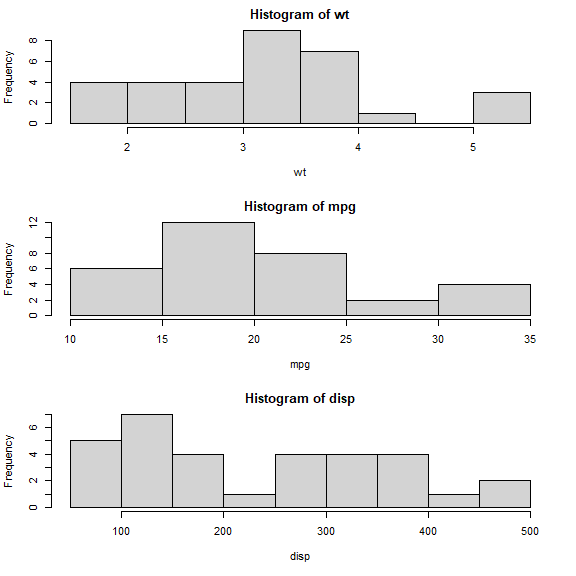
layout()
attach(mtcars)
layout(
matrix(
c(1, 1, 2, 3),
2, 2,
byrow=TRUE
)
)
hist(wt)
hist(mpg)
hist(disp)
detach(mtcars)
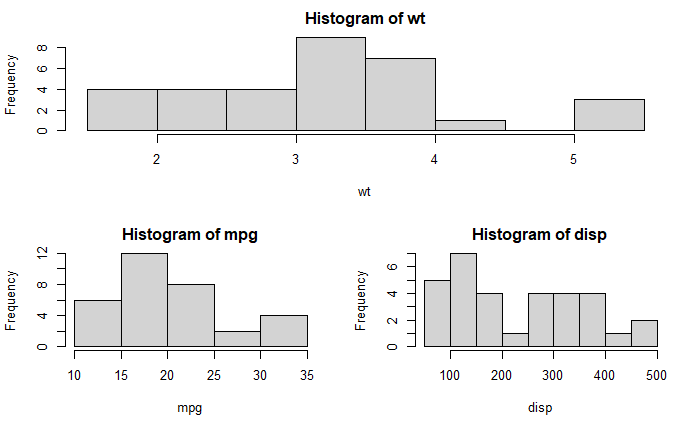
widths 和 heights 参数
attach(mtcars)
layout(
matrix(
c(1, 1, 2, 3),
2, 2,
byrow=TRUE
),
widths=c(3, 1),
heights=c(1, 2)
)
hist(wt)
hist(mpg)
hist(disp)
detach(mtcars)
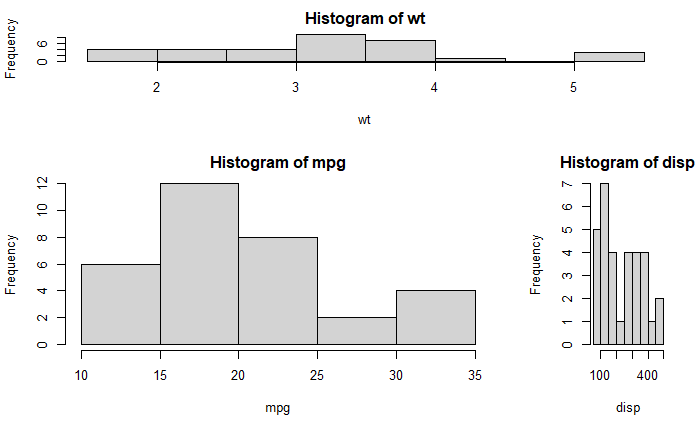
布局的精细控制:fig 参数
opar <- par(no.readonly=TRUE)
par(fig=c(0, 0.8, 0, 0.8))
plot(
mtcars$wt, mtcars$mpg,
xlab="Miles Per Gallon",
ylab="Car Weight"
)
par(fig=c(0, 0.8, 0.45, 1), new=TRUE)
boxplot(
mtcars$wt,
horizontal=TRUE,
axes=FALSE
)
par(
fig=c(0.55, 1, 0, 0.8),
new=TRUE
)
boxplot(mtcars$mpg, axes=FALSE)
mtext(
"Enhanced Scatterplot",
side=3,
outer=TRUE,
line=-3
)
par(opar)
